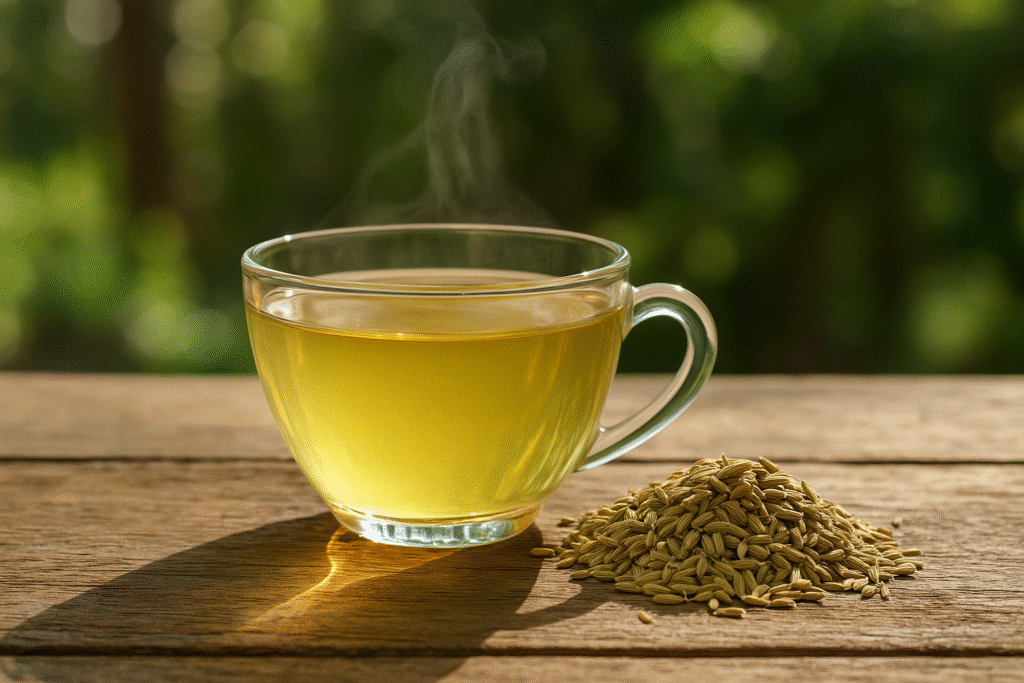Anise (Pimpinella anisum) is a widely used medicinal plant in Brazil and many cultures around the world. Its sweet aroma and mild flavor make it one of the most popular herbs in teas, natural remedies, and even culinary recipes. Traditionally used to relieve digestive discomfort, anise also offers calming and anti-inflammatory properties that make it a true ally for natural health.
In this article, you’ll discover the key benefits of anise, how to use it, indications, contraindications, and some curiosities that show why this plant is a great option for those seeking natural alternatives.
🌿 What is anise?
Anise is an herbaceous plant native to the Mediterranean region, grown mainly for its aromatic seeds, which contain essential oils with medicinal properties. It should not be confused with fennel (Foeniculum vulgare), a different species from the same botanical family (Apiaceae).
In Brazil, the seeds are commonly used to prepare homemade teas, known for their digestive and calming effects. The essential oil extracted from anise is also used in aromatherapy and pharmaceutical products.
✅ Main Benefits of Anise
Anise is rich in bioactive compounds such as anethole, estragole, and methyl chavicol, which contribute to its therapeutic effects. Here are the top benefits:
1. Relief from cramps and bloating
Anise tea is well-known for relaxing the muscles of the digestive tract, helping to relieve colic, abdominal cramps, and gas. It’s often recommended (in moderation) for colicky infants, under medical supervision.
2. Calming effect
Thanks to its mild sedative action, anise helps reduce anxiety, stress, and insomnia. A warm cup before bedtime can naturally improve sleep quality.
3. Antioxidant and anti-inflammatory properties
Studies show that anise has antioxidant effects, helping to fight free radicals and reduce inflammation. This makes it helpful for overall cell protection and mild discomfort.
4. Digestive aid
After heavy meals, anise tea can help ease digestion, preventing feelings of fullness or indigestion. It may also be helpful in cases of mild nausea and reflux.
5. Support for women’s health
Anise has mild estrogenic activity, which may be beneficial for PMS and menopausal symptoms like irritability, cramps, and hot flashes. However, regular use should be monitored.
🍵 How to Make Anise Tea
Ingredients:
- 1 teaspoon of anise seeds
- 1 cup of hot water
Preparation:
- Bring the water to a boil.
- Remove from heat and add the seeds.
- Cover and let steep for 5 to 10 minutes.
- Strain and drink while warm.
Recommended dosage: up to 2 or 3 cups per day. Avoid adding sugar to preserve the digestive benefits.
⚠️ Is anise safe? Contraindications
Although anise is considered safe, it should be used with care in some cases:
- Pregnant or breastfeeding women should consult a healthcare professional.
- People with allergies to Apiaceae plants (e.g., parsley, celery, coriander) should avoid it.
- Excessive use can cause mild side effects like nausea or dizziness.
- Anise should not replace medical treatment for chronic or serious conditions.
❓ What’s the difference between anise and fennel?
This is a common source of confusion. Here’s a simple comparison:
| Feature | Anise (Pimpinella anisum) | Fennel (Foeniculum vulgare) |
|---|---|---|
| Flavor | Sweet, like licorice | Sweet, slightly stronger |
| Part used | Seeds | Seeds, leaves, and bulb |
| Botanical family | Apiaceae | Apiaceae |
| English name | Anise or Aniseed | Fennel |
| Use in teas | Common in Latin America | Common in Europe |
While both have similar uses (digestive, calming, anti-inflammatory), they are not the same plant.
🌟 Fun facts about anise
- Used by ancient Egyptians as offerings to the gods and digestive medicine.
- Ancient Romans believed it brought longevity and good fortune.
- In Brazil, it’s common in homemade breads and cakes, especially during June festivals.
✅ Conclusion
Anise (Pimpinella anisum) is a powerful, accessible plant with centuries of use in natural medicine. Whether to ease digestion, support better sleep, or relieve tension, it remains a favorite for those who value natural healing. Still, it should be used wisely and with professional guidance if needed.

Discover Rare and Beautiful Succulents
Looking for unique, healthy, and eye-catching succulents? At Leaf & Clay, you’ll find exotic varieties perfect for any indoor garden or tropical plant collection.
Explore their curated selection and get inspired to grow something extraordinary today
This bold tropical herb offers more than flavor — discover its surprising benefits, cultural roots, and culinary power.

